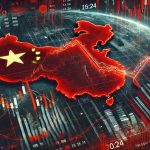
Hey folks! Today, we're unraveling the mess that is China’s economy. And trust me, this isn’t just a little stumble—it’s like watching someone juggle flaming torches while standing on a tightrope, and you can see the rope starting to fray. It’s more than a dip; it’s a wild balancing act on the edge of collapse. Ready to dive into this economic circus? Let’s get into it.
What’s Really Happening in China? Not Just a Slowdown
For those of you keeping an eye on China’s markets, you’ve probably noticed that it hasn’t been the best year for them. Actually, calling it a “bad year” might be putting it too lightly. By China’s own (often inflated) statistics, they’re not even close to hitting their GDP growth target of 5%. And if we’re being real here, private analysts—folks with a clearer picture of the situation—suspect it’s much worse. The government’s metrics? Yeah, those are about as reliable as a flip phone at a tech conference.
How Did We Get Here? A Quick Recap of China's Economic Woes
Let’s not forget that China’s economy took a hard stumble back in 2019, right before the COVID-19 pandemic even hit. Despite a few positive blips since then, things have largely remained down in the dumps. The Chinese government’s reaction to the pandemic—strict lockdowns, forced quarantines—crushed their economy, and the so-called recovery is barely a shadow of what it needs to be.
If we were to conduct a forensic audit of China’s economic books, it wouldn’t be shocking to find that the Chinese economy hasn’t actually grown in the last few years. I mean, the Chinese Communist Party is notorious for fudging the numbers, not out of malice, but because the whole system is designed to “look good” rather than actually be good. You can’t trust local or national stats in China—it’s like trying to get fitness advice from a fast-food commercial.
Throwing "Stimulus" at the Problem Isn't a Solution
Recently, China has thrown out a few so-called “stimulus” measures to try to fix the situation. They’ve tweaked mortgage rates, reduced the reserve requirement (which means banks have to hold onto less money), and done other little things here and there. But let’s be real for a second: that’s like putting a band-aid on a sinking ship. These minor adjustments are barely stimulating anything, let alone addressing the real issues.
The Real Issue: China's Aging Population and Declining Consumption
Here’s the kicker: China doesn’t have enough young people left to really goose its economy. That’s right, folks. China has an aging population problem that would make Florida blush. Nearly everyone under 50 is already entrenched in the system, and there's no new surge of young consumers ready to spend money. So, even if the government wanted to stimulate consumption—which they really don’t—it’s not going to work.
Think about it: you can’t fix a problem with consumption when there are fewer and fewer people to consume! To make matters worse, Xi Jinping’s administration doesn’t even prioritize consumer spending as a legitimate driver of economic growth. In Xi’s worldview, the state comes first, and the people come second—or maybe third. So, the idea of promoting a consumer-driven economy is more alien to China’s leadership than the concept of self-checkout is to your grandparents.
Chinese Banks: The Real House of Cards
But that’s not even the worst part. The real issue—one that’s been simmering for decades—is the Chinese banking system. It’s completely broken. Unlike in the U.S., where banks are regulated (sort of) to ensure that they don’t lend money like it’s Monopoly cash, Chinese banks have been on an unchecked lending spree for years. And I mean years.
In China, the government basically forces the banks to lend money to everyone and everything, often at near-zero or even negative interest rates. And let me tell you, if you’re a business getting free money from the bank, you’re going to spend it—whether or not your venture makes any sense. That’s how you end up with ghost cities: massive urban developments with no one living in them, financed by a banking system that’s built on thin air.
In the U.S., we call this kind of bad lending “subprime.” You might remember that term from, oh, 2008? Yeah, that little financial crisis that shook the global economy. In China, however, subprime loans are the rule, not the exception. And the reckoning is coming.
The Non-Performing Loan Nightmare
When a loan goes bad in the U.S., it gets classified as a “non-performing loan” (NPL). If just 1-2% of a bank’s loans fall into this category, regulators start to panic. In China, estimates suggest that NPLs make up between 5.5% and 6% of total loans across the entire banking system. Let that sink in for a second.
That means China’s banking sector is already in deep trouble. For every relatively healthy bank on the coast, where foreign money and exports keep things humming, there are banks in the interior provinces that are absolutely drowning in bad loans. And unlike the U.S., China doesn’t have the same mechanisms to deal with this kind of systemic financial risk.
What's Next for China’s Economy? Spoiler: It’s Not a Quick Fix
So, what’s next for China? Well, it’s not going to be pretty. In order to fix their banking system, China would need to go through a major financial crisis—a “reset” if you will. In the U.S., we’ve had these resets before: think the Savings and Loan crisis of the 1980s or the subprime mortgage crisis of 2007-2008. They were painful, sure, but they cleaned out the system. China hasn’t had one of these resets yet, and it’s long overdue.
But here’s the thing: when China finally does go through this financial crisis, it’s going to be massive. We’re talking about a collapse that could make the 2008 financial crisis look like a mild recession in comparison. Why? Because China’s entire economy is so much more fragile, and their safety nets—both economic and social—are far less developed than those in the U.S.
The Global Impact: Buckle Up, It’s Going to Get Bumpy
When China sneezes, the global economy catches a cold. We’ve heard this phrase before, but it’s more relevant now than ever. A Chinese financial crisis won’t just stay in China. It will ripple across global markets, disrupting everything from supply chains to financial markets to trade deals. If you thought the COVID-19 pandemic disrupted the global economy, just wait until China’s financial house of cards comes tumbling down.
Is There a Way Out for China? Maybe, But It’s Complicated
So, is there any hope for China? Maybe. But it’s not going to be easy, and it’s certainly not going to happen overnight. In order to stabilize their economy, China will need to reform its banking system, deal with the massive amounts of bad debt, and find a way to encourage real, sustainable growth.
That’s easier said than done, though, especially with a government that’s more focused on maintaining power than on fostering economic innovation. Xi Jinping’s administration is more interested in state control than in market-driven solutions, which means that real reform is unlikely anytime soon.
Final Thoughts: What Does This Mean for You?
If you’re reading this from the comfort of your home in the U.S. or Europe, you might be thinking, “Why should I care about China’s economy?” Well, here’s why: what happens in China doesn’t stay in China. The interconnected nature of the global economy means that a Chinese financial crisis will affect everything from the price of goods to the stability of global markets.
So, while you might not be able to do anything about China’s economy directly, it’s important to stay informed and be prepared for the potential fallout. Keep an eye on global markets, diversify your investments, and be ready for a bumpy ride.
Join the Conversation: What Do You Think About China’s Economic Future?
Now that I’ve laid out the situation, I want to hear from you. Do you think China will be able to avoid a major financial crisis, or is it inevitable at this point? How do you think a Chinese financial meltdown would impact the global economy? Share your thoughts in the comments below!
Also, if you’re not already a part of the iNthacity community, what are you waiting for? Apply to become a permanent resident, then a citizen of the "Shining City on the Web". Let’s continue this conversation, share ideas, and help each other navigate the complex world of global economics.
It's not over...check out our gripping short story that continues the conversation: The Fault in the Gears of Empire
Disclaimer: This article may contain affiliate links. If you click on these links and make a purchase, we may receive a commission at no additional cost to you. Our recommendations and reviews are always independent and objective, aiming to provide you with the best information and resources.
Get Exclusive Stories, Photos, Art & Offers - Subscribe Today!
Related posts:
 China’s Economy in Crisis: Why Its Stock Market Just Can’t Catch a Break
China’s Economy in Crisis: Why Its Stock Market Just Can’t Catch a Break
 Why China’s Imminent Collapse Could Trigger Global Economic Shockwaves
Why China’s Imminent Collapse Could Trigger Global Economic Shockwaves
 China’s Tech and Nuclear Struggles: Why Their Superpower Status Is Slipping
China’s Tech and Nuclear Struggles: Why Their Superpower Status Is Slipping
 Trump 2.0: Navigating China’s Rise and Its Implications for America
Trump 2.0: Navigating China’s Rise and Its Implications for America
 Bitcoin Price Surge Could Happen Before Trump Inauguration in 2025
Bitcoin Price Surge Could Happen Before Trump Inauguration in 2025


















Post Comment
You must be logged in to post a comment.